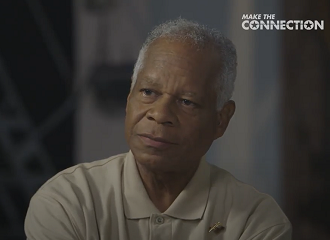Supporting MST Survivors
3-minute read
Supporting MST Survivors
3-minute read
After Jennifer was sexually assaulted during her military service, she says, “I just kind of held it inside, and I didn’t talk about it for 10 years.” The Navy Seabee Veteran was finally able to reveal her trauma to a new doctor — a woman who urged Jennifer to attend group therapy. “And that’s when I was able to see that I wasn’t alone,” she recalls.
The support Jennifer felt — first from her doctor and then from the women in her therapy group — gave her the strength to work through the sadness and anger that had troubled her for a decade after her trauma. Through therapy, she says she also found the tools she needed to manage her emotions and became the kind of mother she wanted to be.
Military sexual trauma (MST) is sexual assault or sexual harassment that occurs during military service. For many Veterans like Jennifer, MST can continue to affect their mental and physical health, work, relationships, or everyday life — sometimes years after the experience.

Stronger Together | Supporting MST Survivors
MST can affect survivors in many complex ways. Common responses include disturbing memories or nightmares; difficulty feeling safe; feeling depressed or numb; using alcohol or other drugs to numb or escape from negative feelings; feeling isolated from other people; difficulties with anger, irritability, or other strong emotions; self-doubt, self-blame, or low self-esteem; issues with sleep; physical health problems; and more. Because MST can have such a wide and devastating range of effects, it can be very helpful for survivors to have support as they work through any lingering emotional issues. The support can come in the form of individual or group therapy, community connections, and personal relationships.
In addition to the emotional effects of MST, the decision to report — or not to report — an attacker can come with fear, frustration, shame, or confusion. “I knew if I would say something, that would definitely end my career as I knew it,” says Matt. He was afraid to report that he had been held hostage and assaulted — both physically and sexually — while serving in the U.S. Navy in the mid-1990s. Matt eventually reported the incident and the perpetrator was disciplined.
After leaving the Navy, Matt had to learn to lean into the support of his treatment team at VA before he could really heal. “Once I started believing that these people were trying to help me, and I started trusting them, that’s when things really started to look up for me,” he says.
Nadine, a 26-year Veteran of the Coast Guard, shared Matt’s fear about reporting the person who traumatized her. “Who’s going to believe me?” she asks. “He was very respected and stuff like that, so I felt like I was suffering in silence. And basically, I was.”
Like Jennifer, Nadine found that group therapy with other women who experienced MST was empowering. “It was consoling to have other people that you can identify with,” she says, adding that when she was feeling weak or vulnerable, the other women were her strength, and she was the same for them.
Decades after transitioning from the U.S. Navy during the Vietnam era, Robert began having angry outbursts. He had surrounded himself with emotional walls after being sexually assaulted and realized he needed to deal with his trauma and include his new wife, Vanessa, in his journey. Vanessa joined Robert in family therapy and learned ways to provide him the support he needs, including during his outbursts. “I understand it now, and I try to figure out what triggers it,” she says.
“Community is critical,” explains Charles, a pastor who has counseled MST survivors. “The trauma and the pain that we’ve experienced — we have to work through it, in community with others.” That community of healing might include a pastor like Charles, friends and fellow MST survivors like Jennifer and Nadine, a treatment team like Matt’s, or a loved one like Vanessa.

